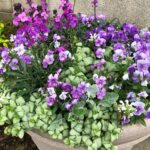Introduction
Nitrogen is a key nutrient for maintaining healthy soil and plants. It is essential for the development of strong root systems, stems, and leaves. Plants need nitrogen to produce chlorophyll and build proteins which are vital for their growth. Plants get nitrogen from natural sources in the soil such as compost, manures, decomposed plant material, leguminous plants, and microorganisms. For organic gardening, applying these natural sources of nitrogen in the form of an organic fertilizer can improve soil fertility, encourage growth of healthy plants, store carbon, break up clay soils, reduce the need for water and pest control products and improve yields.
Organic gardeners can take advantage of several methods to provide proper nutrition to their garden including composting and adding natural nitrogen sources like manures or compost tea. Composting provides a slow release form of nitrogen which will fertilize over time without leaching into groundwater or running off into other areas. Manures provide nutrients quickly but can be high in salts which might damage sensitive plants while compost tea introduces beneficial bacteria that help plants absorb nutrients more effectively while improving water retention capacity of soil. Leguminous cover crops are also very effective at increasing soil’s biological activity by providing immediate access to nitrate-N (nitrogen) from the heavens. Cover crops harvested after flowering can also add organic matter to your garden beds if incorporated appropriately. Lastly adding quality mulches such as uncut grass clippings or seaweed mulch can benefit your garden by providing nitrogen-rich organic material that will break down over time into usable nutrients for your growing vegetables or flowers!
Role of Nitrogen in Organic Gardening
Nitrogen is an essential macronutrient for the growth and development of garden plants. It plays an important role in promoting good root and stem growth and leaf intensity. Nitrogen helps to increase the size and number of leaves on a plant as well as helping it to complete its life cycle in a healthy manner. As nitrogen is a mobile nutrient, it needs to be replenished frequently to ensure optimal levels are available for plant growth.
Organic sources of nitrogen include composting, intercrop planting, using nitrate-rich animal manures, treating crop residues with nitrate-producing bacteria, or applying green manure crops such as clover or lupin to provide slow release of nitrogen into the soil. Organic matter like grass clippings can help increase the availability of nitrogen in soils by slowly breaking down over time, releasing nitrogen that can be used by plants. The use of leguminous plants like peas and beans can also improve soil fertility due to the ability of some species to fix atmospheric nitrogen into their cells. This increases the amount of nitrogen available in the environment for other plants. Cover crops are another excellent way to add nitrogen into your organic garden as they return that which was taken away when harvesting or cultivating a previous set up bed. Lastly, adding rhizobacteria or azotobacter that contain enzymes able to convert atmospheric nitrogen (N2) into ammonium (NH4), is also beneficial providing yet another form of natural fertilization methods suitable for organic gardens.
Different Sources of Nitrogen for Organic Gardening
Nitrogen is a key element for producing healthy, vibrant plants. It is widely used and applied in the form of chemical-based fertilizers in modern large-scale agricultural practices. However, there are ways to supply nitrogen to your garden without resorting to these types of hazardous and highly polluting products.
Organic sources of nitrogen are a more sustainable way to fertilize your garden while still providing the beneficial elements needed by plants. These can include compost, manure from grass-eating animals such as cows or horses, fish emulsion, dried blood meal, cottonseed meal and green manures (e.g., clover and rye grass). Composting not only provides organic nitrogen but also adds important minerals, trace elements and microbes that promote nutrient cycling within the soil which is essential for healthy soil ecology. Manure can help provide organic matter which helps reduce soil compaction and improves aeration in the root zone which allows for better water infiltration. Fish emulsion is abundant in both iron and nitrogen while blood meals offer a concentrated source of readily available nitrogen that is easily absorbed by plants. Cottonseed meal contains moderate amounts of nitrogen as well as other beneficial minerals like potassium and phosphorus while green manures increase diversity in a garden system as well as help retain moisture levels in the soil during periods of drought. All of these sources provide an eco-friendly way to maintain nutrient content required for healthy plant growth over time.
How To Apply Nitrogen to Your Organic Garden
When applying nitrogen to your organic garden, it is important to do so in a careful and considered manner. There are several ways to supply nitrogen organically, including adding composting matter such as manure, bone meal, blood meal or cottonseed meal; using a natural fertilizer like fish emulsion, seaweed extract or alfalfa meal; or with cover crops such as clover, winter rye or field peas. Ideally, nitrogen should be applied in multiple amounts over the course of the growing season; this allows the plants to absorb nutrients gradually which minimizes risk of burning and encourages steady growth.
One way to apply nitrogen for your organic garden is through composts and mulches. These materials provide slow-release forms of nitrogen by breaking down into the soil over time. Composting material should be worked into the soil and covered with a layer of mulch. Applying 3-4 inches at a time helps ensure that plants have access to soil nutrients as they decompose. Furthermore, greensand and rock phosphate are natural mineral fertilizers that contain high concentrations of nitrates and can release these nutrients over long periods of time. They also improve aeration within the soil because they help break up clay particles which allow for better root penetration. Finally legumes can also be used as green manures – these fast growing members of the pea family help fix atmospheric nitrogen through their roots which helps improve soil fertility when incorporated into soil at their maturity date.
Best Practices For Nitrogen Usage in Organic Gardening
Nitrogen is essential for plant growth and development, so it has an important role to play in organic gardening. Every gardener should strive to find the right balance between their plants’ nitrogen needs and the long-term sustainability of their soil and overall garden ecosystem. To achieve this balance, the best practices for using nitrogen fertilizer in an organic gardening setting includes:
1. Using low-nitrogen sources of fertility such as compost, manure, and green manures instead of relying exclusively on synthetic fertilizers.
2. Ensuring that the application rate of nitrogen fertilizer is correct for each moment in the growing season, taking into consideration any additional nitrogen that may be released through decomposition of organic matter or microbial activity.
3. Ensuring that nitrogen levels are suitable for all plants within a garden bed or other environment, including those requiring higher or lower amounts than others nearby.
4. Rotating crops in soil which have different nutrient requirements with alternating years to help maintain balanced soil fertility levels over time.
5. Paying close attention to soil tests when deciding how much nitrogen your plants need, ensuring that you use fertilizers containing adequate amounts of other nutrients at the same time such as phosphorus and potassium.
6. Applying fertilizer no more frequently than every few weeks to ensure that it gets evenly absorbed by your plants without causing excess run-off or leaching into groundwater sources.
7. Choosing eco-friendly sources for purchasing your fertilizer whenever possible as part of a responsible approach to sustainable gardening practices overall.
Negative Effects of Over-Applying Nitrogen in Organic Gardening
Over-applying nitrogen in organic gardening can have negative consequences for both humans and the environment. Excess nitrogen contributes to algal blooms which can choke rivers and lakes, deplete oxygen levels in the water, kill fish, and make conditions potentially dangerous for people who drink from contaminated sources. Over-application of nitrogen near residential areas can also increase smog and ground level ozone causing potential health problems especially for people suffering from respiratory or cardiovascular illnesses. It can also lead to nitrogen toxicity in plants resulting in yellowing leaves, slower growth rate, and death of plants due to nutrient imbalance. Further, an excessive amount of ammonia released through over-application of nitrogen can be hazardous when inhaled by humans.
Conclusion
Organic gardening is becoming more and more popular as people become increasingly aware of their impact on the environment. This type of gardening relies solely on natural, organic materials and processes to seek a healthier (and ultimately more rewarding) soil environment. A key element that all gardeners need to consider when wanting to maximize their plants’ growth potential is nitrogen—an important nutrient for plant survival, as well as being essential in helping repair damaged soils. By understanding the role and benefits of nitrogen, organic gardeners will be better equipped to provide the most suitable growing conditions for their plants.
Benefits of nitrogen when it comes to organic gardening include: improving soil fertility through the breaking down of dead material and adding nutrients; aiding in photosynthesis, which aids in the production of chlorophyll; enhancing disease resistance in plants by providing energy for growth in affected areas; and facilitating efficient water absorption for increased drought tolerance. Additionally, beneficial microorganisms that live within nitrogen-containing soils are encouraged to thrive which can reduce pests and diseases naturally.
In conclusion, nitrogen plays a vital role in keeping an organic garden healthy and productive for many years. By ensuring enough nitrogen is available through regular fertilization practices or with composting or manure applications, organic gardeners can enhance their soil fertility allowing healthy crop yields while reducing toxicity levels and extending the life cycle of larger crops like trees or other perennial plants.

Welcome to my gardening blog! I am passionate about plants and enjoy sharing my knowledge and experiences with others. In this blog, I will write about everything related to gardening, from tips on how to get started to updates on my own garden projects.





